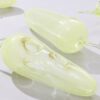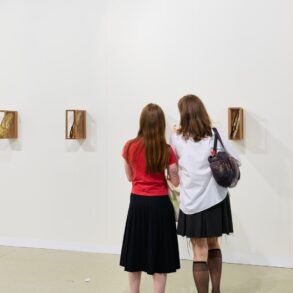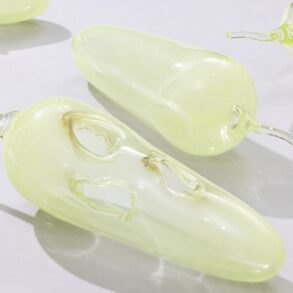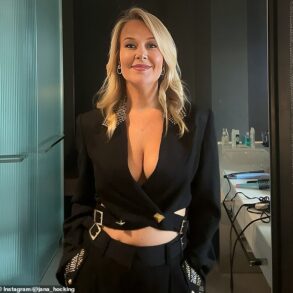When visiting this record store in Hobart you might find Lauren Carter and her three daughters playing hidden gems or well-loved works from a breadth of female artists.
In 2020, Lauren was on a mission to listen to more music by women.
But whilst sifting through the crates of records at her local record stores, she became frustrated, unable to find her favourite artists on vinyl.
Lauren Carter wanted to find and listen to more female artists, so she proposed a solution. (ABC News: Ebony ten Broeke)
After breakfast one morning she posed an idea to her husband Oberon: a record store that just celebrates music by women. Three months later, Suffragette Records was opened at Battery Point.
“We’ve always done everything as a family,”
Lauren said.
Lauren, Oberon and her daughters Audrey, Xanthe and Maisie work together selling records and mixtapes to various customers who walk through their doors each day.
Lauren Carter (right) runs the store with her husband and their daughters. (ABC News: Ebony ten Broeke)
Passionate about empowering women, Suffragette Records is an extension of the values Lauren instilled within her daughters from a young age.
“I’ve always said to girls, ‘Make sure you take up space, because you deserve to be here, and you deserve to do whatever you want to do.'”
The daughter to Jon Blanchfield, who was a pop singer in the 1960s and a band manager in the 80s, Lauren said she noticed male-dominance within the music industry from an early age.
Lauren’s father Jon was a recording artist, later turning his hand to managing acts. (ABC News: Ebony ten Broeke)
“My memory of women in the music industry is that they are girlfriends or receptionists … or if they’re doing well as musicians, they’re ‘difficult divas’… that’s always been a narrative in the Australian music industry.“
Whilst there’s been an improvement since the 80s, Lauren said gender imbalance in the music industry was still prevalent.
“There are countries where women’s voices aren’t allowed to be heard at all. And when you think about it, [women’s voices] being heard has only happened for such a very short period of history.
“We can see it here on the shelves. It’s really only the last 50 years maybe that women are actually given a platform to tell their own stories in their own words.“
Lauren says gender imbalance is still a problem in the music industry. (ABC News: Ebony ten Broeke)
Little progress for women in latest statistics
There has not been an in-depth Australian report on female representation in the music industry since 2019.
The report, By the Numbers 2019, by triple j Hack, found the gender gap in the Australian music scene was slowly narrowing, but male artists continued to dominate.
In the United States, the latest report from the USC Annenberg Inclusion Initiative found women made up 37.7 per cent of artists across the Billboard Hot 100 Year-End Chart in 2024 — a 2.7 per cent increase from the year prior.
But Stacy L Smith — the researcher behind the report — said the slight increase represented a decline in the number of men, while the number of women was consistent with previous years.
Behind the scenes, roles have also shown a lack of progress.
Female songwriters sat at 18.9 per cent and producer credits at 5.9 per cent — both a decrease from 2023.
Although the latest statistics show little change, across the last decade, the same report highlights positive progress for female representation in the music industry.
In 2014, women made up 20.9 per cent of artists across 1,300 popular songs. Fast forward 10 years, the figure has grown by more than 15 per cent.
‘I had to be one of the boys’ to survive, artist says
Lutruwita/Hobart based artist EWAH said progress was welcome, but the job was far from done.
Emma Waters, musical artist EWAH, says she’s seen toxic behaviour in the industry. (ABC News: Ebony ten Broeke)
“It’s great that we’ve got like a third of the music industry represented … at least in a performance sense, less in the producer sense … but it’s important to remain vigilant, because things can just change really quickly,” she said.
She said she had personal experience of gender imbalance in the music industry, and that because it was highly unregulated “a lot of toxic behaviour can survive”.
“I felt like I had to kind of be one of the boys a bit to kind of survive … or just shield some of the femininity.
There are still barriers for women, EWAH says. (ABC News: Ebony ten Broeke)
“Feeling that male gaze, or the expectations of what ability might be … they’re barriers that we’re still breaking through.
Maybe it’s not as overt, but there’s still a lot of casual sexism that goes on.”
EWAH said the music industry had been constructed to favour a male lifestyle, which could also create barriers.
“Women are more likely to be primary caregivers … and so they have to have really robust support structures in place like care or family to be able to support them.
“Things like the time of day that events happen … these things can favour a non-family sort of structure.“
Producer credits for women are still low, a US music industry report shows. (ABC News: Ebony ten Broeke)
She added people needed to continue fighting for equality.
“If we don’t actually go out and actively support, then things can disappear … I think it is about supporting by buying, attending and listening.”
Celebrate what you love
The Carter family both echo and embody EWAH’s message.
Audrey, Lauren’s eldest daughter, encouraged listeners to support female artists by purchasing their vinyls.
“It’s really important to remember that streaming is not actually as great as you think it is,”
she said.
Audrey Carter says the store helps lift up the profile of female artists. (ABC News: Ebony ten Broeke)
“There’s sort of this idea if an artist gets a lot of streams they’re really successful, but in reality, there’s actually a very small percentage of money that comes from each stream.”
The family of five take an optimistic approach to what can, at times, feel like a “helpless” issue.
“We’ve found that the best way to address issues that are kind of heavy and you can feel a little bit helpless about … is to celebrate what you love. That’s kind of where we’ve gone with this.” Lauren said.
Xanthe and Maisie Carter are on hand to help customers find what they need. (ABC News: Ebony ten Broeke)
“We’re never excluding anyone. We’re just going, ‘Hey, women are here, and we’re going to celebrate them and support them’,” Audrey said.
“We’re not putting anyone else down. We’re just bringing this specific group up. And I think that that is incredibly important.“
The Carter family, left to right: Maisie, Audrey, Xanthe, Lauren and Oberon. (ABC News: Ebony ten Broeke)
This post was originally published on this site be sure to check out more of their content







